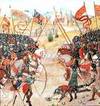The Battle of Agincourt
One of my favorite Shakespeare writings is Shakespeare’s Saint Crispen’s Day speech from his play Henry V. The last part of the speech reads:
This day is call’d the feast of Crispian.
He that outlives this day, and comes safe home,
Will stand a tip-toe when this day is nam’d,
And rouse him at the name of Crispian.
He that shall live this day, and see old age,
Will yearly on the vigil feast his neighbours,
And say ‘To-morrow is Saint Crispian.’
Then will he strip his sleeve and show his scars,
And say ‘These wounds I had on Crispian’s day.’
Old men forget; yet all shall be forgot,
But he’ll remember, with advantages,
What feats he did that day. Then shall our names,
Familiar in his mouth as household words-
Harry the King, Bedford and Exeter,
Warwick and Talbot, Salisbury and Gloucester-
Be in their flowing cups freshly rememb’red.
This story shall the good man teach his son;
And Crispin Crispian shall ne’er go by,
From this day to the ending of the world,
But we in it shall be remembered-
We few, we happy few, we band of brothers;
For he to-day that sheds his blood with me
Shall be my brother; be he ne’er so vile,
This day shall gentle his condition;
And gentlemen in England now-a-bed
Shall think themselves accurs’d they were not here,
And hold their manhoods cheap whiles any speaks
That fought with us upon Saint Crispin’s day.
I’m reading a book of history which referred to this battle. The actual battle was the Battle of Agincourt in 1415 between the English army of Henry V and the French of Charles VI after Henry had invaded French. It was fought in freshly ploughed field after a heavy rain which made it very muddy. The French army was  heavily armored and on horseback. The battle was notable because of the use of the English longbow. The English had driven sharp stakes in the ground at an angle to stop the French cavalry. The muddy ground made negotiation by the French on horses next to impossible and the heavy armorer made them move slowly creating an easy target for the arrows as they advanced on the English lines. The flurry of English arrows killed horses and men. The English archer carried over seventy arrows which he could fire in minutes and their range was over two hundred yards. The result was a defeat for the French who suffered heavy loses.
heavily armored and on horseback. The battle was notable because of the use of the English longbow. The English had driven sharp stakes in the ground at an angle to stop the French cavalry. The muddy ground made negotiation by the French on horses next to impossible and the heavy armorer made them move slowly creating an easy target for the arrows as they advanced on the English lines. The flurry of English arrows killed horses and men. The English archer carried over seventy arrows which he could fire in minutes and their range was over two hundred yards. The result was a defeat for the French who suffered heavy loses.
So there is your history lesson for today.
